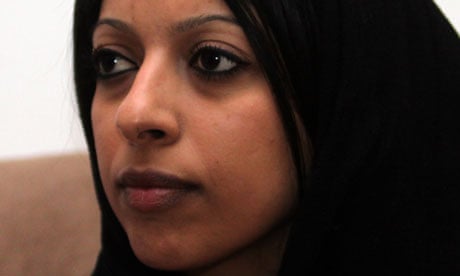Zainab al-Khawaja, the Bahraini human rights activist who witnessed her father, husband and brother-in-law being beaten and imprisoned by masked soldiers earlier this month has ended her hunger strike.
The 27-year-old mother of one told the Guardian that she has decided to stop her 10-day fast after becoming convinced that "being silent in a tomb and not able to speak is not in the interests of my family."
Her decision follows pressure from human rights groups who tried to persuade her to use her voice in support of the protest movement, arguing that the Bahraini government would rather she were dead than alive.
Meanwhile, Khawaja's hopes of seeing her family again were given a boost, after relatives received phonecalls from the authorities on Wednesday indicating that the three men were alive.
Khawaja's husband, Wafi Almajed, called his mother from custody and asked for his father to bring clothes, a toothbrush and shampoo for him to the fort in Manama, the capital.
Bahraini officials also phoned making the same request for Khawaja's brother-in-law, Hussein Ahmed, and asked the family to bring essentials to a military court for her father, Abdulhadi al-Khawaja. The 50-year-old is a prominent critic of the regime who was targeted after he called for the king of Bahrain to face trial. It is thought that Almajed and Ahmed were seized because they were with him at the time.
"We feel so happy," she said. "A few hours ago we were worried if they were dead. At least we know they are OK now. We had very little hope yesterday, so today is a great day."
Zainab al-Khawaja began her hunger strike on 17 April after she described how her father was seized in a violent raid on her home. In the early hours of 10 April, he was "grabbed by the neck, dragged down a flight of stairs and then beaten unconscious in front of me" by at least a dozen masked special forces.
"He never raised his hand to resist them, and the only words he said were: 'I can't breathe,'" she wrote. "Even after he was unconscious, the masked men kept kicking and beating him while cursing and saying that they were going to kill him."
Almost 500 people in Bahrain and around the world have since made pledges to join her in a three-day solidarity hunger strike which was due to end on Wednesday.
Bahrain's ministry of information has failed to answer questions about what had happened to the men for the sixth day running.
Following visits from human rights groups who wanted her to call off the hunger strike, Khawaja started drinking fruit juice and ate a little yoghurt on Wednesday. The decision to end the hunger strike came after her health had deteriorated on Monday and Tuesday, but she stressed this was not the reason for her decision to stop her action.
"Over the last few days my situation was very bad," she said. "I started collapsing every now and then and I had a difficult time speaking. My heart beat very, very fast and I felt I couldn't breathe."
Speaking before Khawaja called off the hunger strike, Nabeel Rajab, president of the Bahrain Centre for Human Rights, said he was among those who had tried to persuade her to stop.
"I said we don't want people dying and suffering," he said. "We are already in misery here and we don't want to see more people lose their life. The government can do that. We are trying to convince her to stop. Her life is too important to us."
Khawaja said she was convinced by international human rights groups to campaign for her family and said she now planned to act as a spokesman for Bahrain's civil and human rights movement.
